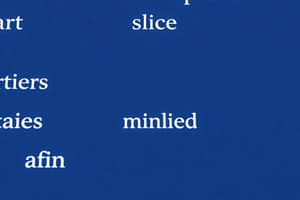Podcast
Questions and Answers
Which type of sentence structure is characterized by having one independent clause and at least one dependent clause?
Which type of sentence structure is characterized by having one independent clause and at least one dependent clause?
- Compound
- Compound-Complex
- Complex (correct)
- Simple
Which of the following literary devices involves a comparison using 'like' or 'as'?
Which of the following literary devices involves a comparison using 'like' or 'as'?
- Imagery
- Metaphor
- Alliteration
- Simile (correct)
What is the primary function of adverbs in a sentence?
What is the primary function of adverbs in a sentence?
- To express emotions
- To modify verbs, adjectives, or other adverbs (correct)
- To modify nouns
- To replace nouns
In the context of punctuation, what is the use of a colon?
In the context of punctuation, what is the use of a colon?
Which of the following themes is commonly explored in literature?
Which of the following themes is commonly explored in literature?
What identifies the form of writing known as poetry?
What identifies the form of writing known as poetry?
Which type of verb tense indicates actions that will occur in the future?
Which type of verb tense indicates actions that will occur in the future?
What distinguishes a compound sentence from other sentence structures?
What distinguishes a compound sentence from other sentence structures?
What is the term for descriptive language that appeals to the senses?
What is the term for descriptive language that appeals to the senses?
Which of the following best describes the main purpose of expository writing?
Which of the following best describes the main purpose of expository writing?
What is a common characteristic of persuasive writing?
What is a common characteristic of persuasive writing?
In the context of the writing process, what phase involves correcting grammar and punctuation errors?
In the context of the writing process, what phase involves correcting grammar and punctuation errors?
Which author is best known for exploring themes of social commentary in their literary works?
Which author is best known for exploring themes of social commentary in their literary works?
What mistake is made when using overused passive voice in writing?
What mistake is made when using overused passive voice in writing?
Which writing strategy is essential for ensuring the logical flow of ideas in an essay?
Which writing strategy is essential for ensuring the logical flow of ideas in an essay?
What is a defining feature of descriptive writing?
What is a defining feature of descriptive writing?
Which of the following errors would qualify as a run-on sentence?
Which of the following errors would qualify as a run-on sentence?
Which author is associated with regionalism and satirical writing?
Which author is associated with regionalism and satirical writing?
What is the primary function of the drafting phase in the writing process?
What is the primary function of the drafting phase in the writing process?
Flashcards are hidden until you start studying
Study Notes
Grammar
-
Parts of Speech:
- Nouns: Names of people, places, things, or ideas.
- Verbs: Action or state of being words.
- Adjectives: Descriptive words that modify nouns.
- Adverbs: Modify verbs, adjectives, or other adverbs; often end in -ly.
- Pronouns: Replace nouns (he, she, it, they).
- Prepositions: Show relationships between nouns/pronouns and other words (in, on, at).
- Conjunctions: Connect words, phrases, or clauses (and, but, or).
- Interjections: Express emotions or exclamations (wow, ouch).
-
Sentence Structure:
- Simple: Contains one independent clause.
- Compound: Contains two or more independent clauses joined by a conjunction.
- Complex: Contains one independent clause and at least one dependent clause.
- Compound-Complex: Contains at least two independent clauses and one or more dependent clauses.
-
Tenses:
- Present (simple, continuous, perfect)
- Past (simple, continuous, perfect)
- Future (simple, continuous, perfect)
-
Punctuation:
- Periods: End declarative sentences.
- Commas: Indicate pauses, separate items in a list, or clauses.
- Semicolons: Connect closely related independent clauses.
- Colons: Introduce lists, quotes, or explanations.
- Apostrophes: Indicate possession or contractions.
Literature
-
Genres:
- Fiction: Novels, short stories, and narratives.
- Non-fiction: Biographies, essays, and articles.
- Poetry: Structured verse, free verse, and lyrical forms.
- Drama: Plays, scripts, and performance literature.
-
Literary Devices:
- Metaphor: A direct comparison between two unlike things.
- Simile: A comparison using "like" or "as."
- Alliteration: Repetition of initial consonant sounds.
- Imagery: Descriptive language that appeals to the senses.
- Symbolism: Using symbols to represent ideas or qualities.
-
Themes:
- Common themes include love, conflict, heroism, identity, and society.
- Thematic analysis focuses on the underlying messages and values.
-
Notable Authors:
- William Shakespeare: Renowned playwright and poet.
- Jane Austen: Known for her novels on social commentary.
- Mark Twain: Notable for his satirical works and regionalism.
Writing Skills
-
Types of Writing:
- Expository: Explains or informs about a topic.
- Descriptive: Paints a picture with words, using sensory details.
- Narrative: Tells a story with a clear sequence of events.
- Persuasive: Argues a position, aiming to convince the reader.
-
Writing Process:
- Prewriting: Brainstorming, outlining, and planning.
- Drafting: Writing the initial version.
- Revising: Improving content and structure.
- Editing: Correcting grammar, punctuation, and style.
- Publishing: Sharing the final product.
-
Strategies for Effective Writing:
- Use clear and concise language.
- Vary sentence structure for interest.
- Ensure coherence and logical flow.
- Tailor writing style to the audience and purpose.
-
Common Mistakes:
- Run-on sentences and fragments.
- Overuse of passive voice.
- Lack of clarity and focus in writing.
Grammar
-
Parts of Speech:
- Nouns: Identify people, places, things, or ideas.
- Verbs: Represent actions or states of being.
- Adjectives: Descriptive words that enhance nouns by providing more detail.
- Adverbs: Modify verbs, adjectives, or other adverbs, frequently ending in -ly.
- Pronouns: Substitute for nouns to avoid repetition (e.g., he, she, it, they).
- Prepositions: Indicate relationships between nouns/pronouns and other words (e.g., in, on, at).
- Conjunctions: Link words, phrases, or clauses (e.g., and, but, or).
- Interjections: Convey emotions or sudden feelings (e.g., wow, ouch).
-
Sentence Structure:
- Simple: Comprises a single independent clause; straightforward structure.
- Compound: Combines two or more independent clauses using conjunctions, enhancing complexity.
- Complex: Involves one independent clause alongside at least one dependent clause, creating depth.
- Compound-Complex: Features at least two independent clauses and one or more dependent clauses, reflecting intricate ideas.
-
Tenses:
- Present: Includes simple, continuous, and perfect forms to express current actions or states.
- Past: Divided into simple, continuous, and perfect forms to discuss actions that occurred previously.
- Future: Encompasses simple, continuous, and perfect forms projecting actions or states yet to come.
-
Punctuation:
- Periods: Mark the end of declarative sentences.
- Commas: Suggest pauses, separate list items, or clauses for clarity.
- Semicolons: Connect closely related independent clauses seamlessly.
- Colons: Introduce lists, quotes, or detailed explanations, signaling importance.
- Apostrophes: Demonstrate possession or form contractions.
Literature
-
Genres:
- Fiction: Includes novels, short stories, and narratives that explore imaginary events.
- Non-fiction: Encompasses biographies, essays, and articles rooted in reality and factual information.
- Poetry: Consists of structured verse, free verse, and lyrical forms, emphasizing rhythm and emotion.
- Drama: Involves plays, scripts, and performance-oriented literature designed for enactment.
-
Literary Devices:
- Metaphor: Establishes a direct comparison between unlike entities for thematic depth.
- Simile: Creates comparisons using "like" or "as," enhancing imagery.
- Alliteration: Involves repetition of initial consonant sounds, adding musicality to text.
- Imagery: Utilizes descriptive language to engage the senses vividly.
- Symbolism: Represents ideas or qualities through symbols, adding layers of meaning.
-
Themes:
- Common themes found in literature include love, conflict, heroism, identity, and societal issues.
- Thematic analysis aims to uncover underlying messages and values in texts.
-
Notable Authors:
- William Shakespeare: Celebrated for his influential plays and poetic works.
- Jane Austen: Renowned for her insightful novels critiquing social norms.
- Mark Twain: Famous for his satirical narratives and regionalist perspective.
Writing Skills
-
Types of Writing:
- Expository: Aims to explain or inform the audience about a specific topic.
- Descriptive: Paints vivid imagery using sensory details, capturing experiences.
- Narrative: Tells a story with a coherent sequence of events and characters.
- Persuasive: Seeks to convince the reader to accept a particular viewpoint or action.
-
Writing Process:
- Prewriting: Involves brainstorming, outlining, and structuring ideas prior to drafting.
- Drafting: Creating the initial version of a written piece, focusing on ideas over precision.
- Revising: Enhancing content and structure for clarity and impact.
- Editing: Correcting grammatical errors, punctuation, and style for polished writing.
- Publishing: Sharing the final work with the intended audience or platform.
-
Strategies for Effective Writing:
- Employ clear and concise language to ensure understanding.
- Vary sentence structure to maintain reader interest and engagement.
- Ensure coherence and logical flow throughout the writing.
- Adapt writing style based on audience and purpose for greater impact.
-
Common Mistakes:
- Run-on sentences and sentence fragments detract from clarity.
- Overuse of passive voice can weaken the writing's assertiveness.
- Lack of clarity and focus may confuse readers and obscure the main message.
Studying That Suits You
Use AI to generate personalized quizzes and flashcards to suit your learning preferences.




